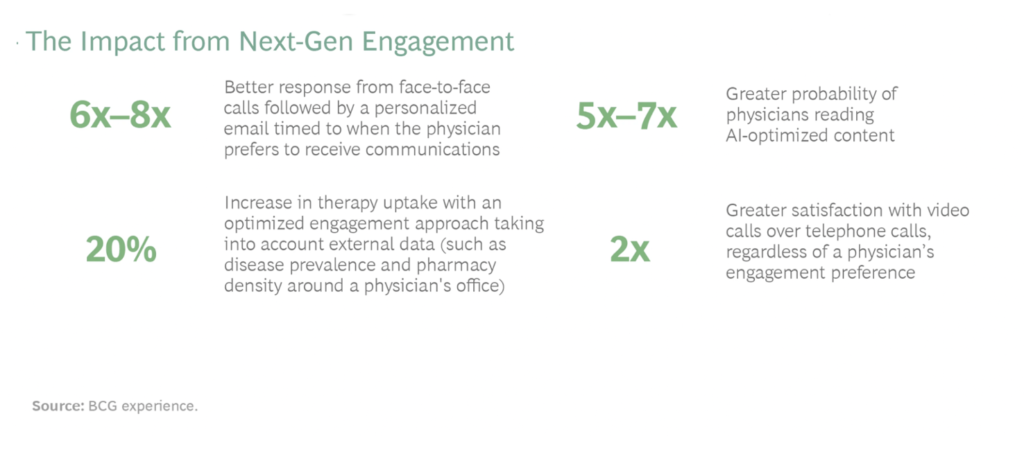Transforming Pharma Engagement: Mastering AI-Powered Personalization for Optimal Customer Experience

In an era marked by rapid digitalization, the pharmaceutical industry stands at the cusp of a significant transformation, with AI-powered personalization leading the charge. This paradigm shift aims to revolutionize how pharmaceutical companies engage with patients and healthcare professionals (HCPs), promising an era of enhanced interactions, improved healthcare outcomes, and a deeper understanding of patient and HCP needs.
The Evolution of Customer Experience in Pharma
The pharmaceutical sector is undergoing a pivotal change, focusing on customer experience as a holistic journey that intersects various digital touchpoints. The complex nature of patient and HCP interactions requires a nuanced approach, blending technological advancements with a deep understanding of individual needs. (Digital Health Coalition). The goal is not merely to provide information but to ensure that every interaction is relevant, timely, and impactful, thereby fostering a stronger, more positive relationship between pharma brands and their customers.
Key Trends Driving AI-Powered Personalization
As seen in this brief history digital pharma engagement, AI has been gaining ground in pharma for several years, beginning with drug discovery and machine learning efforts in the mid-2010s. But, it was not until the release of large language models by OpenAI that the potential for AI personalization took center stage.
| Period | Focus | Key Developments |
| 2008-2013 | Early Digital Engagement | Introduction of websites and email marketing. Initial FDA guidance on internet/social media use. Adoption of EHRs. |
| 2014-2016 | Social Media & mHealth Expansion | Pharma explores social media. Rise of mobile health apps. Guidance on mobile medical applications. |
| 2017-2019 | AI Integration & Personalization | AI in drug discovery and patient engagement. Discussions on AI in clinical settings. Demand for personalized engagement. |
| 2020-2023 | Telehealth & Digital Therapeutics | Telehealth adoption driven by COVID-19. Emergence of digital therapeutics. Temporary regulatory relaxations for telehealth. |
| 2024 & Beyond | AI’s Pervasive Influence | Widespread adoption of AI across the pharma value chain. Enhanced regulatory frameworks focusing on AI. AI as a cornerstone for hyper-personalized patient experiences. |
In this new era, AI is having a profound impact across the entire pharma value stream, but especially in three major areas:
1. Enhanced Patient and HCP Engagement: The digital age demands a shift in how pharmaceutical companies interact with their audience. Through the use of digital technologies, data, and analytics, pharma can now offer personalized experiences at an unprecedented scale. Tailoring communication and support to meet the unique needs of each patient or HCP can significantly improve engagement and outcomes. (BCG Global)
2. Precision and Efficiency in Drug Development: AI and data analytics are not just transforming customer engagement; they are also revolutionizing the drug development process. By facilitating targeted therapy development and optimizing clinical trial patient recruitment, these technologies promise a future where pharmaceutical R&D is not only more efficient but also more patient-centric. (Drug Discovery and Development)
3. Amplifying Programmatic Advertising in Pharma: In the quest for personalized engagement, programmatic advertising emerges as a key player. By automating the ad buying process and leveraging data-driven insights for targeting, pharmaceutical brands can now ensure that their messages reach the right audience at the right time, enhancing the effectiveness of their marketing campaigns. (PharmaLeaders)
Implementing AI Personalization in Pharma
Implementing AI-powered personalization requires a strategic approach, starting with the selection of the right AI software. This foundation enables pharmaceutical companies to support their teams in delivering engaging, personalized experiences. Moreover, continual refinement of AI applications is crucial to adapting and improving strategies over time. (Qualtrics)
Overcoming Challenges
Despite its promise, the journey towards AI-powered personalization is not without its hurdles. Regulatory compliance and data privacy stand out as significant challenges. However, with the right strategies and a focus on ethical standards, these obstacles can be navigated successfully, paving the way for innovative engagement strategies that respect patient privacy while delivering personalized care.
Conclusion
AI-powered personalization represents a groundbreaking shift in the pharmaceutical industry’s approach to customer engagement. By harnessing the power of AI and data analytics, pharma companies can unlock new levels of personalization, transforming patient and HCP interactions. This not only improves healthcare outcomes but also sets the stage for a future where every engagement is as unique as the individuals it serves. As research from BCG shows, AI-driven personalization is having a direct impact on engagement:

As the pharmaceutical industry continues to evolve, embracing AI-powered personalization will be key to staying ahead in the digital age, offering unprecedented opportunities to connect with and support patients and healthcare professionals in more meaningful ways.





